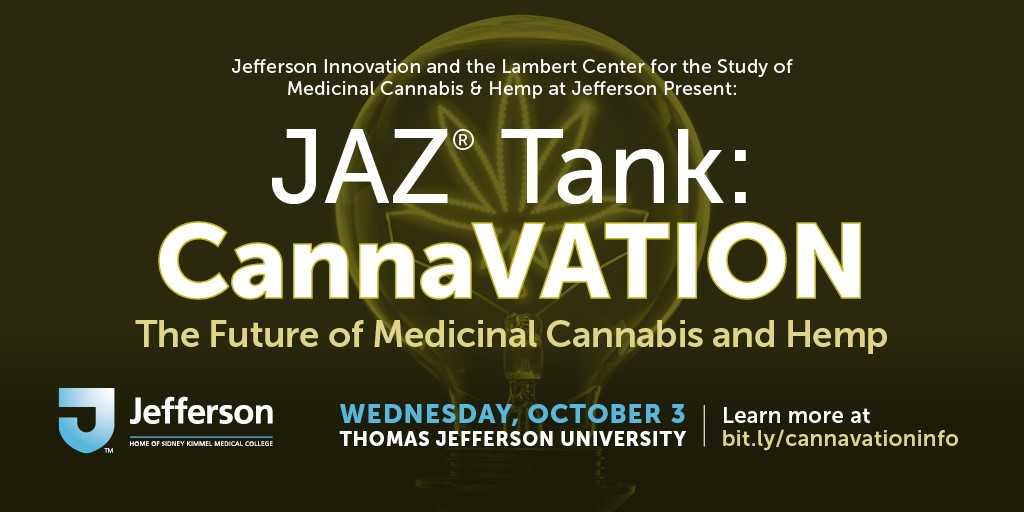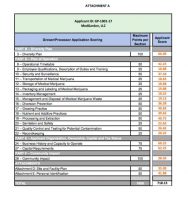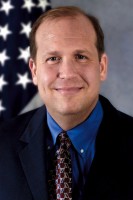Thomas Jefferson University’s Lambert Center for the Study of Medicinal Cannabis and Hemp announced recently that it is co-sponsoring the third annual JAZ Tank Challenge: CannaVATION Edition.
Jefferson Innovation’s 2018 JAZ Tank Challenge: CannaVATION Edition is currently accepting submissions of innovative business models for a chance to compete on October 3, where finalists will each present their business ideas in a 10-minute pitch. Winning submissions could get one free provisional or utility patent application and business and clinical consulting services. The competition will be accepting submissions through August 20, 2018.
Finalists will compete for a $10,000 grand prize, legal support and business consultation services. According to the announcement, in addition to the grand prize winner, up to two other teams could win $5,000 in financial support, one free provisional or utility patent application and consulting services as well.

According to Zoe McKinley, director of entrepreneurship and social impact initiative at the Lambert Center, the competition is designed to have a national focus, not just on the Pennsylvania cannabis industry. “We are excited to shine a spotlight on Pennsylvania, and Thomas Jefferson University specifically, as a hub for research in medical cannabis, but like the competition, the Lambert Center has a national and even international focus,” says McKinley. She says this is also the first year that the JAZ tank is exclusively focused on cannabis.
Jefferson’s Chief Innovation Officer, Dr. Rose Ritts, notes “the competition is about creating a platform for emerging concepts to get a toe-hold on the path to potential commercialization. Anything that will improve patient access or outcomes …or improve the industrial hemp market in the U.S. is definitely of interest,” says Ritts. “We welcome companies to jump into the Challenge, and we also welcome investors or anyone thinking about getting into this space to be in the audience for our event on October 3.”

The challenge is an annual healthcare startup competition, where new businesses with particularly innovative ideas and technology solutions for the legal cannabis space submit their business models to a panel of judges for review. “This event will bring together the most inventive minds to pitch their solutions to stakeholder problems in the still-emerging medical and medicinal cannabis and industrial hemp industries,” reads the announcement. The Lambert Center is seeking applicants in a wide variety of business areas, including patient access, product design, plant science, information management, horticultural technology, sustainability, transportation, security, workforce training, community outreach, banking and public education.
Lambert Center Director Charles Pollack, MD sees the massive growth potential of the legal cannabis industry. “At our Center we are dedicated to identifying new approaches to developing cannabinoid-based therapies that help patients with various debilitating symptoms and diseases,” says Pollack. “Our JAZ Tank Challenge may identify the next great idea in medicinal cannabis.”
 Through the Lambert Center for the Study of Medicinal Cannabis and Hemp, Jefferson is the first major university in the US to provide a comprehensive academic resource for the medicinal, medical and industrial applications and business of cannabis and hemp. The Lambert Center, the first of its kind in academia, provides “expert-developed, unbiased information to clinicians and patients about medical cannabis and cannabinoid-based therapies,” according to their website. They want to “support the development of entrepreneurial and socially responsible business and clinical approaches within the emerging medical cannabis industry and explore and develop new ways to use hemp in medical, industrial, and consumer products,” reads the website.
Through the Lambert Center for the Study of Medicinal Cannabis and Hemp, Jefferson is the first major university in the US to provide a comprehensive academic resource for the medicinal, medical and industrial applications and business of cannabis and hemp. The Lambert Center, the first of its kind in academia, provides “expert-developed, unbiased information to clinicians and patients about medical cannabis and cannabinoid-based therapies,” according to their website. They want to “support the development of entrepreneurial and socially responsible business and clinical approaches within the emerging medical cannabis industry and explore and develop new ways to use hemp in medical, industrial, and consumer products,” reads the website.
McKinley mentions they are looking for creative approaches to solving problems in the medical cannabis and industrial hemp industry. “These could be anything from new products or supply chain innovations to patient support tools to energy management systems that lower the environmental impact of grow facilities,” says McKinley. “We are hoping to see companies that have already launched, or are ready to very quickly.” The third annual JAZ Tank Challenge: CannaVATION Edition is accepting submissions through August 20. Click here for more information.






















 “The PA Medicinal Cannabis Education Tour seeks to rectify the current lack of education on medicinal cannabis by providing current, reliable information on medicinal marijuana and its uses,” reads the press release. The events come at an opportune time: Pennsylvania recently
“The PA Medicinal Cannabis Education Tour seeks to rectify the current lack of education on medicinal cannabis by providing current, reliable information on medicinal marijuana and its uses,” reads the press release. The events come at an opportune time: Pennsylvania recently 






